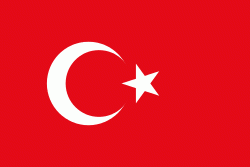Aliağa
Aliağa is a town and a district of Izmir Province in the Aegean Region of Turkey. The town is situated at about 50 km north of Izmir. Aliağa has a large port, mainly for oil and bulk cargo. Its economic activity is based on tourism, shipbreaking, and an oil refinery.
Aliağa lies in the heart of ancient Aeolia. The town was named after a member of the influential Karaosmanoğulları ayan family, Karaosmanoğlu Ali Ağa, who owned an estate here. It was a township in Menemen district in 1937 and became a municipality in 1952. It finally separated from Menemen and became a district on 21 January 1982.
The remains of the ancient city of Myrina are within the boundaries of the district, located at about fifteen km north of Aliağa centre. Another ancient site is the yet unexplored Gryneion, near Şakran township on the peninsula, to the south of the center town, also at a distance of 15 km. Visitors also often use the road from Aliağa to visit the remains of Aigai in Yuntdağı in Manisa Province.
In 2021, a monastery and floor mosaic have been found during an illegal excavation. Archaeologists believe that the monastery was used in the 4th century to the 14th century.
Aliağa lies in the heart of ancient Aeolia. The town was named after a member of the influential Karaosmanoğulları ayan family, Karaosmanoğlu Ali Ağa, who owned an estate here. It was a township in Menemen district in 1937 and became a municipality in 1952. It finally separated from Menemen and became a district on 21 January 1982.
The remains of the ancient city of Myrina are within the boundaries of the district, located at about fifteen km north of Aliağa centre. Another ancient site is the yet unexplored Gryneion, near Şakran township on the peninsula, to the south of the center town, also at a distance of 15 km. Visitors also often use the road from Aliağa to visit the remains of Aigai in Yuntdağı in Manisa Province.
In 2021, a monastery and floor mosaic have been found during an illegal excavation. Archaeologists believe that the monastery was used in the 4th century to the 14th century.
Map - Aliağa
Map
Country - Turkey
 |
|
| Flag of Turkey | |
One of the world's earliest permanently settled regions, present-day Turkey was home to important Neolithic sites like Göbekli Tepe, and was inhabited by ancient civilisations including the Hattians, Hittites, Anatolian peoples, Mycenaean Greeks, Persians and others. Following the conquests of Alexander the Great which started the Hellenistic period, most of the ancient regions in modern Turkey were culturally Hellenised, which continued during the Byzantine era. The Seljuk Turks began migrating in the 11th century, and the Sultanate of Rum ruled Anatolia until the Mongol invasion in 1243, when it disintegrated into small Turkish principalities. Beginning in the late 13th century, the Ottomans united the principalities and conquered the Balkans, and the Turkification of Anatolia increased during the Ottoman period. After Mehmed II conquered Constantinople (Istanbul) in 1453, Ottoman expansion continued under Selim I. During the reign of Suleiman the Magnificent, the Ottoman Empire became a global power. From the late 18th century onwards, the empire's power declined with a gradual loss of territories. Mahmud II started a period of modernisation in the early 19th century. The Young Turk Revolution of 1908 restricted the authority of the Sultan and restored the Ottoman Parliament after a 30-year suspension, ushering the empire into a multi-party period. The 1913 coup d'état put the country under the control of the Three Pashas, who facilitated the Empire's entry into World War I as part of the Central Powers in 1914. During the war, the Ottoman government committed genocides against its Armenian, Greek and Assyrian subjects. After its defeat in the war, the Ottoman Empire was partitioned.
Currency / Language
| ISO | Currency | Symbol | Significant figures |
|---|---|---|---|
| TRY | Turkish lira | ₺ | 2 |
| ISO | Language |
|---|---|
| AV | Avar language |
| AZ | Azerbaijani language |
| KU | Kurdish language |
| TR | Turkish language |















